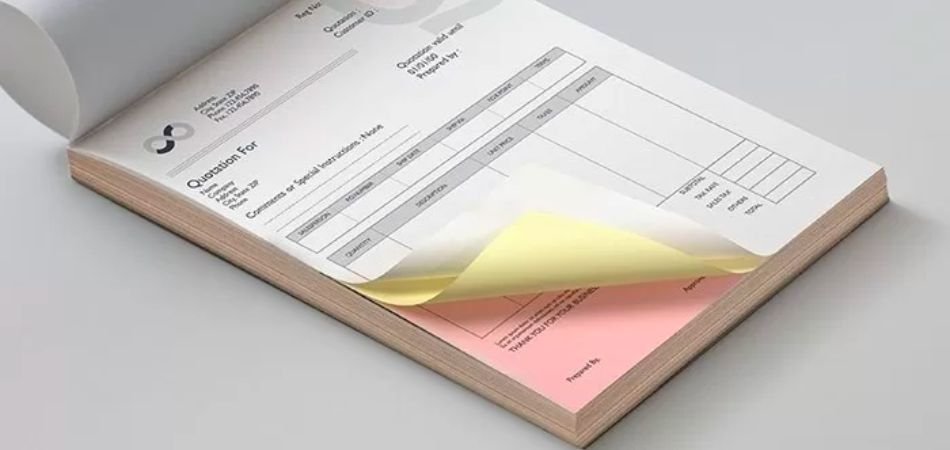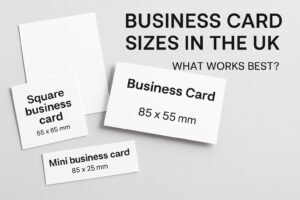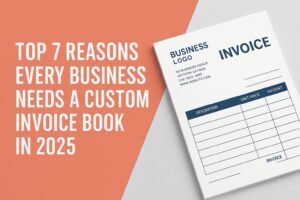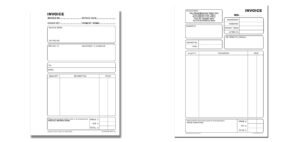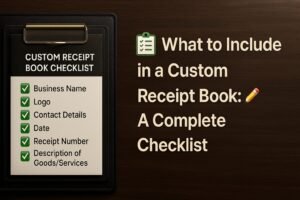As a small business owner, keeping accurate records of all financial transactions is essential. One way to do this is by using invoice books.
In this blog post, we will discuss why invoice books are essential for small businesses, highlighting the benefits of using them such as maintaining accurate records, improving cash flow, and creating a professional image.
Importance of Invoice Books for Small Businesses
Invoice books are an essential tool for small businesses. They help businesses to keep track of sales, purchases, and expenses. By recording every financial transaction, businesses can monitor their income and expenses, identify areas of improvement, and make informed business decisions.
Here are some reasons why invoice books are essential for small businesses:
Maintaining Accurate Records
Invoice books help small businesses to maintain accurate records of their financial transactions. They provide a record of all sales and purchases made by the business, allowing the business owner to track their income and expenses over time. This information is critical for creating financial reports and preparing tax returns.
By maintaining accurate records, small business owners can also identify areas where they can reduce expenses and increase revenue. For example, they can see which products or services are the most profitable and adjust their pricing strategy accordingly.
Improving Cash Flow
Invoice books help small businesses to manage their cash flow effectively. By keeping track of all sales and purchases, businesses can see when payments are due and when they have received payment.
This information allows business owners to manage their cash flow more efficiently and make informed decisions about when to make purchases or investments.
Moreover, invoice books can also help small businesses to chase up on overdue payments. By sending reminders to customers who have not paid their invoices, businesses can reduce the risk of late payments and bad debts.
Creating a Professional Image
Invoice books can help small businesses to create a professional image. By using branded invoice books with their business logo and contact information, businesses can present a professional image to their customers. This can help to build trust and confidence with customers, making it more likely that they will return in the future.
Moreover, using professional-looking invoice books can also help small businesses to stand out from the competition. By creating a unique and memorable design, businesses can differentiate themselves from other businesses in the same industry.
Different Types of Invoice Books
Invoice books come in different types and formats, each with its own advantages and disadvantages. Here are some of the most common types of invoice books used by small businesses:
Duplicate Invoice Books
Duplicate invoice books are the most basic type of invoice book. They consist of two sheets of paper: the original copy and a carbon copy. When a business owner fills out the invoice, the information is transferred onto the carbon copy, creating a duplicate of the original invoice.
Duplicate invoice books are a cost-effective option for small businesses, as they are relatively cheap to produce. However, they have some drawbacks. Firstly, the carbon copy can be hard to read, making it difficult to check for errors. Secondly, they do not provide a record of the transaction on the business owner’s computer or accounting software.
Triplicate Invoice Books
Triplicate invoice books are similar to duplicate invoice books but with an additional sheet of paper. The original copy is still given to the customer, while the second copy is kept for the business owner’s records. The third copy is usually sent to the business owner’s accountant or bookkeeper.
Triplicate invoice books are a good option for businesses that require a more detailed record of their transactions. They provide an extra copy of the invoice for the business owner’s records, allowing them to keep track of their finances more easily. However, they are more expensive than duplicate invoice books.
Quadruplicate Invoice Books
Quadruplicate invoice books are similar to triplicate invoice books but with an additional copy. The original copy is still given to the customer, while the second copy is kept for the business owner’s records. The third copy is usually sent to the business owner’s accountant or bookkeeper, and the fourth copy is kept for the business owner’s own records.
Quadruplicate invoice books are a good option for businesses that require a more detailed record of their transactions and need to keep multiple copies for various purposes. They provide an extra copy of the invoice for the business owner’s own records, allowing them to keep track of their finances more easily. However, they are more expensive than both duplicate and triplicate invoice books.
Personalised Invoice Books
Personalised invoice books are custom-designed invoice books that can be tailored to suit the specific needs of the business. They allow the business owner to include their company logo and contact information, as well as any other relevant information such as payment terms, bank details, and return policies.
Personalised invoice books can help small businesses to create a professional image and stand out from the competition. They also provide a more detailed record of the transaction, making it easier for the business owner to track their finances. However, they are more expensive than pre-printed invoice books.
Tips for Using Invoice Books
Here are some tips for small businesses on how to use invoice books effectively:
Keep your invoice books in a safe place: Make sure your invoice books are kept in a safe and secure location to avoid loss or damage.
Number your invoices:
Numbering your invoices sequentially can help you keep track of your invoices more easily.
Include all relevant information: Make sure you include all relevant information on your invoices, such as your business name, contact information, payment terms, and a description of the products or services provided.
Keep copies of your invoices:
Keep a copy of each invoice for your own records. This will help you keep track of your income and expenses and make it easier to prepare your tax returns.
Send invoices promptly:
Send your invoices promptly to ensure that you get paid on time. Consider setting up automatic reminders to follow up on overdue payments.
Invoicing is a crucial aspect of any small business. By using invoice books, small business owners can maintain accurate records, improve cash flow, and create a professional image. There are different types of invoice books available, each with its own advantages and disadvantages. By following these tips, small businesses can use invoice books effectively and keep their finances in order.
Also read: What does NCR stand for in Printing?
